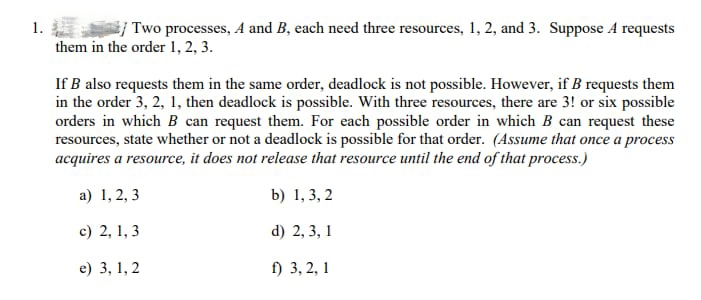1. Two processes, A and B, each need three resources, 1, 2, and 3. Suppose A requests them in the order 1, 2, 3. If B also requests them in the same order, deadlock is not possible. However, if B requests them in the order 3, 2, 1, then deadlock is possible. With three resources, there are 3! or six possible orders in which B can request them. For each possible order in which B can request these resources, state whether or not a deadlock is possible for that order. (Assume that once a process acquires a resource, it does not release that resource until the end of that process.) a) 1, 2, 3 b) 1,3,2 c) 2, 1, 3 d) 2, 3, 1 e) 3, 1, 2 f) 3, 2, 1
1. Two processes, A and B, each need three resources, 1, 2, and 3. Suppose A requests them in the order 1, 2, 3. If B also requests them in the same order, deadlock is not possible. However, if B requests them in the order 3, 2, 1, then deadlock is possible. With three resources, there are 3! or six possible orders in which B can request them. For each possible order in which B can request these resources, state whether or not a deadlock is possible for that order. (Assume that once a process acquires a resource, it does not release that resource until the end of that process.) a) 1, 2, 3 b) 1,3,2 c) 2, 1, 3 d) 2, 3, 1 e) 3, 1, 2 f) 3, 2, 1
Database System Concepts
7th Edition
ISBN:9780078022159
Author:Abraham Silberschatz Professor, Henry F. Korth, S. Sudarshan
Publisher:Abraham Silberschatz Professor, Henry F. Korth, S. Sudarshan
Chapter1: Introduction
Section: Chapter Questions
Problem 1PE
Related questions
Question

Transcribed Image Text:1.
Two processes, A and B, each need three resources, 1, 2, and 3. Suppose 4 requests
them in the order 1, 2, 3.
If B also requests them in the same order, deadlock is not possible. However, if B requests them
in the order 3, 2, 1, then deadlock is possible. With three resources, there are 3! or six possible
orders in which B can request them. For each possible order in which B can request these
resources, state whether or not a deadlock is possible for that order. (Assume that once a process
acquires a resource, it does not release that resource until the end of that process.)
a) 1, 2, 3
b) 1,3,2
c) 2, 1, 3
d) 2, 3, 1
e) 3, 1, 2
f) 3, 2, 1
Expert Solution
This question has been solved!
Explore an expertly crafted, step-by-step solution for a thorough understanding of key concepts.
Step by step
Solved in 2 steps with 2 images

Knowledge Booster
Learn more about
Need a deep-dive on the concept behind this application? Look no further. Learn more about this topic, computer-science and related others by exploring similar questions and additional content below.Recommended textbooks for you

Database System Concepts
Computer Science
ISBN:
9780078022159
Author:
Abraham Silberschatz Professor, Henry F. Korth, S. Sudarshan
Publisher:
McGraw-Hill Education

Starting Out with Python (4th Edition)
Computer Science
ISBN:
9780134444321
Author:
Tony Gaddis
Publisher:
PEARSON

Digital Fundamentals (11th Edition)
Computer Science
ISBN:
9780132737968
Author:
Thomas L. Floyd
Publisher:
PEARSON

Database System Concepts
Computer Science
ISBN:
9780078022159
Author:
Abraham Silberschatz Professor, Henry F. Korth, S. Sudarshan
Publisher:
McGraw-Hill Education

Starting Out with Python (4th Edition)
Computer Science
ISBN:
9780134444321
Author:
Tony Gaddis
Publisher:
PEARSON

Digital Fundamentals (11th Edition)
Computer Science
ISBN:
9780132737968
Author:
Thomas L. Floyd
Publisher:
PEARSON

C How to Program (8th Edition)
Computer Science
ISBN:
9780133976892
Author:
Paul J. Deitel, Harvey Deitel
Publisher:
PEARSON

Database Systems: Design, Implementation, & Manag…
Computer Science
ISBN:
9781337627900
Author:
Carlos Coronel, Steven Morris
Publisher:
Cengage Learning

Programmable Logic Controllers
Computer Science
ISBN:
9780073373843
Author:
Frank D. Petruzella
Publisher:
McGraw-Hill Education